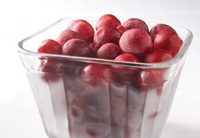Tackling Metabolic Syndrome
NUTRACEUTICALS
It is estimated that more than 50 million Americans have metabolic syndrome. According to information from Mayo Clinic, Rochester, Minn. (www.mayoclinic.com), having metabolic syndrome means having several disorders related to metabolism at the same time, including: obesity, particularly around the waist; elevated blood pressure; elevated level of triglycerides; low level of high-density lipoprotein (HDL) cholesterol; and resistance to insulin.

Insulin resistance appears to be a main contributing factor to metabolic syndrome. Insulin helps control the amount of sugar in the bloodstream, helping glucose enter the body’s cells for fuel. In people with insulin resistance, glucose can’t enter the cells as easily, resulting in higher-than-normal levels of both insulin and glucose in the blood. Increased insulin raises the triglyceride and other blood fat levels and interferes with how the kidneys work, leading to higher blood pressure.
People with metabolic syndrome are at increased risk of coronary heart disease and type 2 diabetes. Getting more physical activity, losing weight, eating healthfully, and quitting smoking are key changes to improve metabolic syndrome components. Fogli-Cawley et al. (2007), for example, showed that dietary patterns consistent with the 2005 Dietary Guidelines for Americans Index were associated with a lower prevalence of metabolic syndrome. The Mediterranean diet, (characterized by a high consumption of fruits, vegetables, legumes and grains; moderate alcohol intake; a moderate-to-low consumption of dairy products and meats/meat products; and a high monounsaturated–to–saturated fat ratio) has also been associated with the prevention of metabolic syndrome (Tortosa et al., 2007).
Emerging research is finding ingredients, including chromium, pectin, and botanicals, that help treat or prevent metabolic syndrome. Here is an update on recent research.
Hops and Acacia
Phytochemicals extracted from hops and acacia have been shown to modulate insulin signaling, a key mechanism in metabolic syndrome and hypercholesterolemia. Metagenics Inc., San Clemente, Calif. (phone 800-692-9400, www.metagenics.com), has developed a supplement that features selective kinase response modulators (SKRMs)—hops rho iso-alpha acids (RIAA) and acacia proanthocyanidins—which have been shown to be anti-inflammatory and can improve insulin sensitivity in adipocytes (i.e., increasing lipogenesis and decreasing lipolysis), explained Matthew Tripp, Vice President, R&D, MetaProteomics, a subsidiary of Metagenics.
"The unique ratio of hops:acacia modulates protein kinase signaling (within cells) in favor of healthy insulin function and blood sugar transport. Balanced kinase signaling helps to maintain healthy blood sugar and triglyceride regulation," said Tripp.
In August 2008, Brian Carroll, Senior Scientist, MetaProteomics, presented some of the company’s work at a scientific meeting in Athens, Greece. "As a natural products chemist, I described in great detail the phytochemical composition of the Acacia nilotica bark extract and hops extract, both of which are key ingredients in our medical food," he stated. One of the notable findings that Carroll presented was the "head-to-head" comparison between Metagenics’ medical food containing these ingredients and a modified Mediterranean-style, low glycemic load diet.
--- PAGE BREAK ---
"It turns out that, in a clinical setting, the use of our medical food resulted in a greater improvement in cardiometabolic risk factors in subjects with metabolic syndrome and hypercholesterolemia than just the Mediterranean diet alone," said Carroll. Results of this trial have recently been published in Nutrition and Metabolism (Lerman et al., 2008).
The company’s medical food, UltraMeal® PLUS 360°, is formulated to provide specialized, multi-mechanistic nutritional support for patients with metabolic syndrome and cardiovascular disease by supplying a combination of the acacia extract, RIAA, plant sterols, and soy protein and isoflavones.
Chromium
Chromium is an essential mineral that appears to have a beneficial role in the regulation of insulin action, metabolic syndrome, and cardiovascular disease. Hummel et al. (2007) explained that tissue chromium levels of subjects with diabetes are lower than those of normal control subjects, and a correlation exists between low circulating levels of chromium and the incidence of type 2 diabetes. In addition, the authors reported that supplementation with chromium picolinate, a stable and highly bioavailable form of chromium, has been shown to reduce insulin resistance and to help reduce the risk of cardiovascular disease and type 2 diabetes. They stated that the existing data suggest concentrating future studies on certain forms such as chromium picolinate and doses of at least 200 mcg/day.
Nutrition 21, Purchase, N.Y. (phone 914-701-4500, www.nutrition21.com), currently holds patents covering the uses of chromium picolinate for reducing hyperglycemia and stabilizing blood glucose, increasing lean body mass and reducing body fat, and for maintaining healthy cholesterol levels. Chromax® chromium picolinate is the company’s flagship ingredient. It is generally recognized as safe for use in foods.
Apple Pectin
A highly methoxylated apple pectin (HMAP) from Obipektin, a division of Natraceutical, Spain (phone +34-9619-20851, www.natraceutical.com), was shown to improve insulin resistance and other cardiometabolic risk factors in Zucker rats, an animal model of genetic obesity and the human metabolic syndrome (Sánchez , 2008). Researchers evaluated the effect of both HMAP and ß-glucan pectin on cardiometabolic risk factors. The rats fed both fiber-enriched diets exhibited a reduction in body weight and in total cholesterol and triglycerides when compared to the Zucker fatty rats fed the standard diet. The effect on the lipid profile was more remarkable in the HMAP group, and a decrease in blood glucose was only noticed in this group. The researchers concluded that the results warrant evaluation in humans to determine if HMAP could be used as a functional ingredient to reduce lipid profile, insulin resistance, and other cardiometabolic risk factors.
Alginate
Paxman et al. (2008) showed that a sodium alginate-based drink offset preclinical metabolic syndrome, including insulin resistance. The researchers explained that uptakes of glucose, triacylglycerols, and cholesterol are increased with increasing body fat and showed that in human subjects with normal and high body mass index, treatment with 1.5 g of a strong-gelling alginate could restore uptake of cholesterol and glucose to the levels of healthy subjects.
The authors concluded that in addition to treating insulin resistance, alginate has the potential to treat type 2 diabetes and hypercholesterolemia and consequently to reduce risk of development of cardiovascular disease.
Botanicals
In May 2008, two research groups joined forces to identify natural compounds that could hold potential in the prevention of metabolic disease and obesity. The researchers with Zen-Bio Inc., Research Triangle Park, N.C. (phone 919-547-0692, 1-866-234-7673, www.zen-bio.com), and Pennington Biomedical Research Center (PBRC), Baton Rouge, La. (phone 225-763-2511, www.pbrf.org), said the initial phase of their collaboration will involve screening thousands of botanical extracts for their beneficial effects on abdominal fat cells and adult stem cells. The Botanical Research Center at PBRC, a collaborative center between PBRC and the Center of Agriculture and the Environment of Rutgers University, provides a unique library of botanical extracts. Researchers from Zen-Bio will screen the compounds with their human fat–derived stem cell screening system.
The overall goal of the botanical research center is to comprehensively evaluate botanicals in addressing the pathophysiologic mechanisms that lead to the development of insulin resistance and metabolic syndrome (Cefalu et al., 2008). Currently, each of the three research projects evaluates a specific botanical (Russian tarragon, Artemisia dracunculus L; shilianhua, Sinocrassula indica; and grape, Vitus vinifera, anthocyanins) and assesses the effect on pathogenic mechanisms leading to the development of insulin resistance. With the completion of the research, scientists anticipate a better understanding of the cellular mechanisms by which insulin resistance develops and the role of botanicals in modulating the progression to metabolic syndrome.
--- PAGE BREAK ---
Canola Protein
Cysteine intake has been shown to affect insulin sensitivity. Mariotti et al. (2008) looked to determine whether rapeseed protein, which is rich in cysteine, could inhibit the onset of metabolic syndrome. They fed rats a diet rich in saturated fats and sucrose, which also included 20% protein, either as milk protein (Induction Diet I) or rapeseed protein (Diet R) for 9 weeks. A third, control group received a diet containing milk protein but polyunsaturated fats and starch (Prudent Diet P).
Plasma glucose, insulin, and triacylglycerols increased during the experiment and, at week 9, plasma insulin was 34% lower in the R group and 56% lower in the P group as compared with the I group. The insulin peak after the glucose load was 28–30% lower in R and P than in I, and the insulin sensitivity index was significantly higher in R than in I. The researchers concluded that in this model, substituting rapeseed protein for milk protein had preventive effects on the early onset of insulin resistance, similar to those achieved by manipulating the types of dietary fat and carbohydrates.
Tart Cherries
Tart cherries have recently been implicated in reducing symptoms of metabolic syndrome. Seymour et al. (2008) fed both at-risk rats with metabolic syndrome and lean, healthy rats a cherry-enriched Western diet, characterized by high fat and moderate carbohydrate. The cherry-enriched diets, which consisted of whole tart cherry powder as 1% of the diet, reduced two known markers of inflammation by up to 50%. TNF-alpha was reduced by 50% in the lean rats and 40% in the at-risk rats, and interleukin 6 (IL-6) was lowered by 31% in the at-risk rats and 38% in the lean rats.
"We’re learning how important reducing inflammation is for our overall health and lowering the risk for heart disease and type 2 diabetes," said study co-author Steven F. Bolling. Both lean and at-risk rats also experienced lower cholesterol and triglyceride levels on the cherry-enriched diet. The most at-risk animals also reduced their abdominal fat and total fat mass.
by Linda Milo Ohr,
Contributing Editor, Denver, Colo.
[email protected]
References
Cefalu, W.T., Ye, J., Zuberi, A., Ribnicky, D.M., Raskin, I., Liu, Z., Wang, Z.Q., Brantley, P.J., Howard, L., and Lefevre, M. 2008. Botanicals and the metabolic syndrome. Am. J. Clin. Nutr. 87(2): 481S–487S.
Fogli-Cawley, J.J., Dwyer, J.T., Saltzman, E., McCullough, M.L., Troy, L.M., Meigs, J.B., and Jacques, P.F. 2007. The 2005 Dietary Guidelines for Americans and risk of the metabolic syndrome. Am. J. Clin. Nutr. 86: 1193–1201.
Hummel, M., Standl, E., and Schnell, O. 2007. Chromium in metabolic and cardiovascular disease. Horm. Metab. Res. 39(10): 743–751.
Lerman, R.H., Minich, D.M., Darland, G., Lamb, J.J., Schiltz, B., Babish, J.G., Bland, J.S., and Tripp, M.L. 2008. Enhancement of a modified Mediterranean-style, low glycemic load diet with specific phytochemicals improves cardiometabolic risk factors in subjects with metabolic syndrome and hypercholesterolemia in a randomized trial. Nutr. & Metab. 5: 29.
Mariotti, F., Hermier, D., Sarrat, C., Magné, J., Fénart, E., Evrard, J., Tomé, D., and Huneau, J.F. 2008. Rapeseed protein inhibits the initiation of insulin resistance by a high-saturated fat high-sucrose diet in rats. Brit. J. of Nutr. 100(5): 984–991.
Paxman, J.R., Richardson, J.C., Dettmar, P.W., and Corfe, B.M. 2008. Alginate reduces the increased uptake of cholesterol and glucose in overweight male subjects: a pilot study. Nutr. Res. 28(8): 501–505.
Sánchez, D., Muguerza, B., Moulay, L., Hernández, R., Miguel, M., and Aleixandre, A. 2008. Highly methoxylated pectin improves insulin resistance and other cardiometabolic risk factors in Zucker fatty rats. J. of Ag. and Food Chem. 56(10): 3574–3581.
Seymour, E.M., Urcuyo-Llanes, D., Lewis, S.K., Kirakosyan, A., Kaufman, P.B., Bennink, M.R., Bolling, S.F. 2008. Tart cherry-enriched diets reduce abdominal obesity and inflammation in Zucker fatty rats. Exp. Biol. 2008. Presented in mini-symposium 702.7, Dietary Bioactive Compounds III: Chronic Disease Risk Reduction.
Tortosa, A., Bes-Rastrollo, M., Sanchez-Villegas, A., Basterra-Gortari, F.J., Nuñez-Cordoba, J.M., and Martinez-Gonzalez, M.A. 2007. Mediterranean diet inversely associated with the incidence of metabolic syndrome: the SUN prospective cohort. Diabetes Care. 30: 2957–2959.


